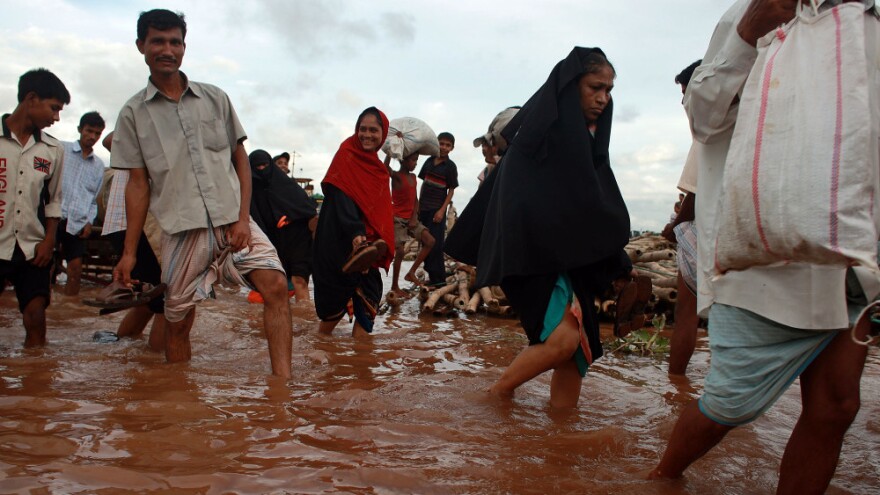At this year's United Nations climate-treaty talks in Cancun, diplomats are taking a less ambitious approach and hoping for incremental progress.
Last year's climate talks in Copenhagen attracted many world leaders, including President Obama, and the goal was to create a global regime to hold carbon dioxide emissions in check to slow global warming.
But the meeting was fractious and ended without a strong agreement. Still, there is momentum, particularly from Europe, to use the United Nations process to take on this global issue.
Saleemul Huq, a senior fellow in the Climate Change Group at the International Institute for Environment and Development in London, says people are hoping to use the meeting in Cancun, which began Monday, to regroup.
"People are lowering expectations so that we get something out of it," Huq says. "I think the approach we had last year in Copenhagen, where it was an all-or-nothing approach, blew up in our faces, and we got nothing out of it."
Financing Climate Policy
The Cancun meetings could possibly put some flesh on the bones of a nonbinding accord that came out of Copenhagen. The U.S., China, India and other major players signed on to long-term, voluntary emissions reductions. But it wasn't formally adopted by the United Nations.
Jennifer Morgan, director of the climate and energy program at the World Resources Institute, said it was big on concepts but short on details, like financing.
"The accord said: 'Let's start a fund.' But it was just a few sentences," Morgan says. "What kind of fund? Hopefully in Cancun they can decide, as the U.N., to start a fund, and how they're actually going to get it up and running."
In fact, financing is the one area where there could be progress in Cancun. Earlier this fall, the United Nations pulled together a committee to figure out how the rich nations of the world could raise $100 billion a year to help the poor countries adapt to climate change.
Norwegian Prime Minister Jens Stoltenberg co-chaired that committee, and in an interview with NPR, he said they tried to figure out how economic development and climate protection could move forward hand in hand.
"One way of obtaining that is, of course, to make sure that the economic growth in the developing world is cleaner, not as polluting as the economic growth has been in the developed world," Stoltenberg says. "And that's one of the reasons why we focus so much on financing."
Stoltenberg's committee concluded that the world needs to put a price on carbon emissions in order to raise money for the developing world. That's admittedly a tough sell, at least in the short run, in this global economic climate.
"It's unrealistic to believe that the meeting in Cancun can agree on all the different proposals we have in our report, but hopefully Cancun can agree how to move forward," Stoltenberg says. "Finance is a key also because it creates a climate of trust between developing and developed countries."
Little Progress On Slowing Emissions
One perennial issue is how Third World nations would spend the money that rich nations have pledged. Huq argues that his home country, Bangladesh, actually is setting a good example. The low-lying nation has drawn up plans for how it would cope with rising sea levels, which are expected as a result of global warming.
"It includes a variety of things, from dredging the rivers to prevent overflowing and flooding, investing in agriculture, new crops, new rice varieties that can be grown in the coastal areas with increasing salinity," Huq says. "And they've actually made quite a lot of progress on this."
Huq is also guardedly optimistic that diplomats can make incremental progress in Cancun to limit deforestation, which is a key element of coping with climate change. But don't expect big progress on the core of the climate treaty: measures to slow emissions from the world's biggest emitters, China and the U.S.
China has shown no interest in making legally binding promises in that regard, and in the wake of the U.S. elections, there's essentially no prospect now for aggressive climate legislation here.
Still, Morgan, with the World Resources Institute, says she'd like to hear President Obama reiterate the pledge he made in Copenhagen: enacting policies that would reduce our nation's emissions by 17 percent in the next decade.
"Without that, it's awfully hard for others to trust that the U.S. is serious about doing anything about global warming," she says. "And that makes success in Cancun a pretty hard thing to imagine."
Copyright 2020 NPR. To see more, visit https://www.npr.org. 9(MDAxNDQ2NDAxMDEyNzU2NzM2ODA3ZGI1ZA001))




